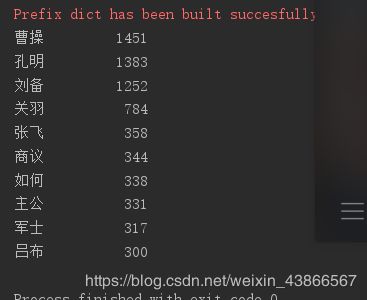python初学者 笔记四 jieba库的使用(有实例)
注:本文非标准教程,仅是总结个人学习过程,可能存在纰漏,如有错误之处欢迎留言告知,非常感谢
来自:中国大学mooc 《Python语言程序设计》北京理工大学 嵩天、黄天羽、礼欣
jieba库概述
jieba是优秀的中文分词第三方库
- 中文文本需要通过分词获得单个的词语
- jieba是优秀的中文分词第三方库,需要额外安装
- jieba库提供三种分词模式,最简单只需掌握一个函数
jieba库的安装
(cmd命令行) pip install jieba
jieba分词的三种模式
精确模式、全模式、搜索引擎模式
- 精确模式:把文本精确的切分开,不存在冗余单词
- 全模式:把文本中所有可能的词语都扫描出来,有冗余
- 搜索引擎模式:在精确模式基础上,对长词再次切分
jieba库常用函数
文本词频统计
英文文本:Hamet 分析词频
https://python123.io/resources/pye/hamlet.txt
#CalHamletV1.py
def getText():
txt = open("hamlet.txt", "r").read()
txt = txt.lower()
for ch in '!"#$%&()*+,-./:;<=>?@[\\]^_‘{|}~':
txt = txt.replace(ch, " ") #将文本中特殊字符替换为空格
return txt
hamletTxt = getText()
words = hamletTxt.split()
counts = {}
for word in words:
counts[word] = counts.get(word,0) + 1
items = list(counts.items())
items.sort(key=lambda x:x[1], reverse=True)
for i in range(10):
word, count = items[i]
print ("{0:<10}{1:>5}".format(word, count))
中文文本:《三国演义》 分析人物
https://python123.io/resources/pye/threekingdoms.txt
《三国演义》人物出场统计 第一个版本
#CalThreeKingdomsV1.py
import jieba
txt = open("threekingdoms.txt", "r", encoding='utf-8').read()
words = jieba.lcut(txt)
counts = {}
for word in words:
if len(word) == 1:
continue
else:
counts[word] = counts.get(word,0) + 1
items = list(counts.items())
items.sort(key=lambda x:x[1], reverse=True)
for i in range(15):
word, count = items[i]
print ("{0:<10}{1:>5}".format(word, count))
#CalThreeKingdomsV2.py
import jieba
excludes = {"将军","却说","荆州","二人","不可","不能","如此"}
txt = open("threekingdoms.txt", "r", encoding='utf-8').read()
words = jieba.lcut(txt)
counts = {}
for word in words:
if len(word) == 1:
continue
elif word == "诸葛亮" or word == "孔明曰":
rword = "孔明"
elif word == "关公" or word == "云长":
rword = "关羽"
elif word == "玄德" or word == "玄德曰":
rword = "刘备"
elif word == "孟德" or word == "丞相":
rword = "曹操"
else:
rword = word
counts[rword] = counts.get(rword,0) + 1
for word in excludes:
del counts[word]
items = list(counts.items())
items.sort(key=lambda x:x[1], reverse=True)
for i in range(10):
word, count = items[i]
print ("{0:<10}{1:>5}".format(word, count))



